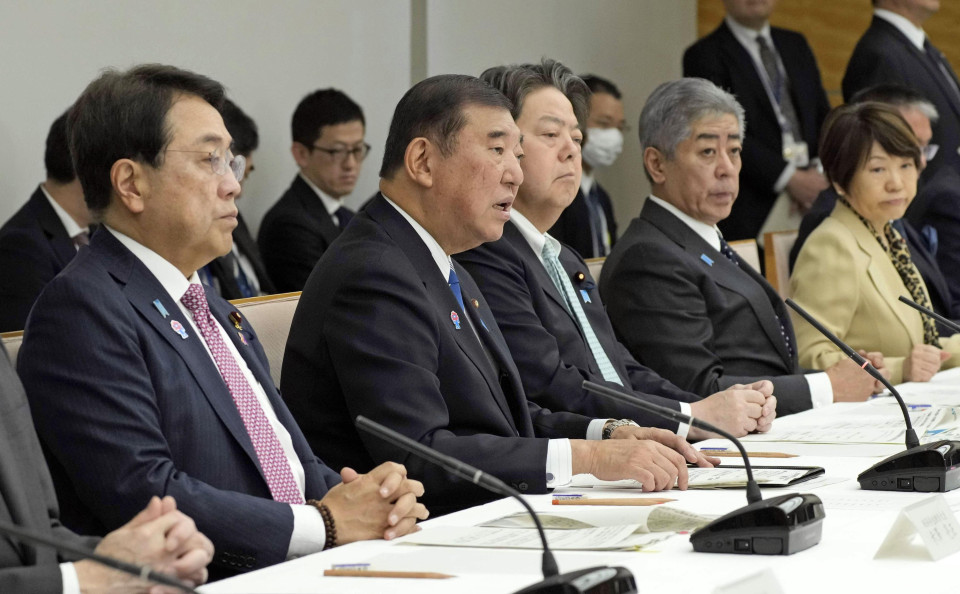Prime Minister Shigeru Ishiba on Friday instructed his close aide Ryosei Akazawa to conduct upcoming tariff negotiations with the United States for the benefit of both nations, as he pledged a whole-of-Japan effort to address a “national crisis.”
Ishiba said the government should combine resources across ministries and agencies to urge the United States, Japan’s closest ally, to retract a spate of tariff measures implemented by President Donald Trump. The effort should be focused on protecting Japan’s export-driven economy from the expected fallout.
Economic revitalization minister Akazawa, who is expected to travel to the United States next week, vowed to prioritize tariff negotiations to produce “good results” for Japan. Ishiba formally tasked Akazawa with the responsibility at the prime minister’s office on Friday.
“Part of the reciprocal tariff has been put on hold, but there is no change in the fact that sectors, such as auto, steel and aluminum, that serve as the backbone of our country, and the broader global economy would take a big hit” from the U.S. tariff policy, Ishiba told a government task force meeting.

Japanese Prime Minister Shigeru Ishiba (2nd from L, front) attends a meeting of a comprehensive task force to discuss how to respond to U.S. President Donald Trump’s imposition of reciprocal tariffs at the prime minister’s office in Tokyo on April 11, 2025. Economic revitalization minister Ryosei Akazawa (L), who is responsible for tariff talks with the United States, also attended. (Kyodo) ==Kyodo
“We are putting together an ‘all-Japan’ team to engage in negotiations with the United States and take necessary support measures for domestic industries,” he said.
While U.S. Treasury Secretary Scott Bessent, Akazawa’s counterpart, has said Japan would be given priority in negotiations because it came forward quickly, concessions are expected to be hard won.
On Thursday, Trump again took issue with what he sees as a “one-sided” bilateral security treaty, a remark signaling his preference to include defense-related issues, especially the need for more spending by Japan, in tariff talks. Japan shoulders part of the cost of U.S. forces stationed in the country based on the treaty.
When Ishiba and Trump held a phone conversation on Monday, they agreed to appoint ministers to advance tariff negotiations.
Trump abruptly paused “reciprocal” tariffs on U.S. trading partners designed to rectify what he sees as imbalanced trade. In Japan’s case, he imposed a 24 percent tariff. Despite Trump’s 90-day reprieve, a baseline tariff of 10 percent remains in place.
Concern over an intensifying trade conflict between the United States and China along with the imposition of other tariffs on steel, aluminum, cars and vehicle components has raised fears of a global recession, rattling financial markets.
Trump has not budged from his hard-line stance on China, slapping the world’s second-largest economy with a staggering 145 percent tariff, in an escalation of their trade war.
Japan has taken the view that Trump’s tariff salvo threatens the multilateral trading system. During his first term as president, Japan reached a trade pact with the United States while saving a trans-Pacific free trade deal from collapse after the United States withdrew.
Ishiba held a phone conversation with British Prime Minister Keir Starmer on Thursday and agreed that a trade war does not benefit anyone and that it is time for a “cool, calm and pragmatic approach,” according to the British government.
Japan and Britain are members of the Comprehensive and Progressive Agreement for Trans-Pacific Partnership that went into effect without the United States.
Related coverage:
90-day reprieve from U.S. reciprocal tariffs “positive”: Japan
China imposes 84% retaliatory tariffs on U.S. as trade war escalates
Trump pauses country-specific tariffs for 90 days, except for China

AloJapan.com